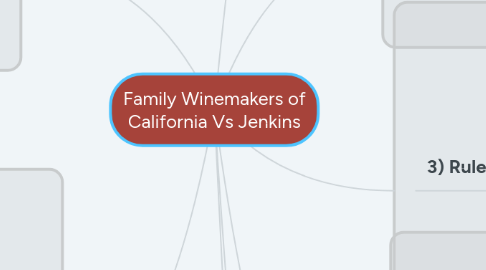
1. 8) Impact on other court cases
1.1. Wal-Mart P.R., Inc. v. Zaragoza-Gomez, 834 F.3d 110, 2016 U.S. App. LEXIS 15592 (1st Cir. P.R. 2016)
1.1.1. Walmart in Puerto Rico alleged that Puerto Rico violated the dormant commerce clause by implementing alternative minimum tax (AMT) for business entities located outside Puerto Rico,
1.1.1.1. Appeals court Decision ruled in favor of Walmart
1.2. DIRECTV, LLC v. Department of Revenue, 470 Mass. 647, 2015 Mass. LEXIS 94, 25 N.E.3d 258 (2015)
1.2.1. Direct TV alleged State of Massachusetts had implemented unfair tax laws that favored local cable networks over Direct TV, thus violating the commerce clause.
1.2.1.1. In this case the courts ruled in favor of the State of Massachusetts as the commerce clause applies to similar business entities and Direct TV and local cable networks had different business models which allowed Massachusetts to create different tax requirements for each of them
2. 7) Importance for Business Professionals
2.1. Many Businesses run across state boundaries and business professionals need to be aware of the commerce clause understand when their rights are impinged and when to seek legal help.
2.2. Laws may not be discriminatory on the face but still could be discriminatory under the commerce clause
3. 1) Facts
3.1. Parties
3.1.1. Plaintiff -
3.1.1.1. Family Winemakers of California
3.1.2. Defendant-
3.1.2.1. Eddie. J.Jenkins, Chairman of The Massachusetts Alcoholic Beverages ControlCommision
3.1.3. Judge
3.1.3.1. Rya. W. Zobel, United States District Judge
3.2. What Happened?
3.2.1. All the wineries in Massachusetts produce less than 30000 gallons of wines except for a few wineries that produce apple wines.
3.2.2. Most of wineries producing more than 30000 gallons of wines are outside Massachusetts.
3.2.3. In 2006, Massachusetts enforced a new law in which the Large wineries ( i.e. producing more than 30000 gallons of wine) were either allowed to have shipping license to sell their wines through the three tier system or through direct sales but not both, with the exceptions of wineries that produce other fruit wines ( not grapes)
3.2.4. Smallers wineries on the other hand, could use both the direct sales and the three tier systems.
3.2.5. Thus this law clearly preferred the in-state wineries to the out of state wineries just by its mere design.
3.3. Procedural History
3.3.1. Out of state wineries went to the court against the new statute that Massachusetts had introduced.
3.3.1.1. Federal Court ruled in favor of the Winemakers applying the Commerce clause
3.3.1.1.1. Defendants appealed to the US Appeals court hoping for a more favorable judgement.
4. 2) Issue
4.1. California winemakers alleged that Massachusetts law obstructed out of state vendors from competing in Massachusetts and gives the local winemakers an competitive edge advantage in Massachusetts.
4.1.1. Federal courts agreed with the Family winemakers of California and did not allow the statute to be enforced.
4.1.1.1. The defendants appealed in the US. Appeals court.
4.1.1.1.1. Thus the issue before the Appeals court is whether Massachusetts is protected by the 21st Amendment or The commerce clause is applicable thus preventing Massachusetts from enforcing the law and allowing larger winemakers the freedom to distribute their product in more thane way in Massachusetts.
5. 3) Rule of Law
5.1. Commerce Clause
5.1.1. The Commerce clause prevents states from establishing laws or regulations that interfere with trade and commerce amongst states.
5.1.1.1. Plaintiffs argued that there was discrimination under the commerce clause. Massachusetts law gives differential treatment to instate and out of state businesses that benefits the in-state business and hurts the out of state business.
5.2. 21st Amendment
5.2.1. 21st Amendment allows individual states to regulate all applicable laws concerning availability of alcoholic beverages.
5.2.1.1. Defendants claim that they should be allowed to regulate laws under the 21st Amendment.
6. 4) Application
6.1. Plaintiff alleges the defendant of differentiating between the instate and out of state wineries
6.1.1. Large out of state wineries have to choose between direct shipping or using the three tier system , but cannot use both
6.1.2. The small in state wineries have no such restriction thus they would be able to reach more consumers and have a clear economic advantage.
6.1.3. Moreover if given a choice between direct shipping or choosing wholesalers, the larger wineries would probably end up choosing the wholesalers.
6.1.3.1. This is another economic advantage for instate wholesalers and thus further promotes instate business and economic growth.
6.1.4. In addition to the above , Massachusetts also excluded fruit wines from the large wineries criteria as there were some of those in the states.
6.1.4.1. This exclusion clearly shows that they were targeting the out of state wineries while protecting their in state businesses
6.2. Defendants argue that states have the right to regulate alcohol laws under the 21st amendment and their rights should be protected.
7. 6) Influence
7.1. Business Practices Influenced
7.1.1. This case influenced how instate and out of state winery businesses are carried out.
7.1.2. Out of states wineries are able to ship alcohol directly and through three tier system.
7.1.3. Fair competition in winery businesses.
7.1.4. Competition causes reduction in prices which allows consumers multiple options.
